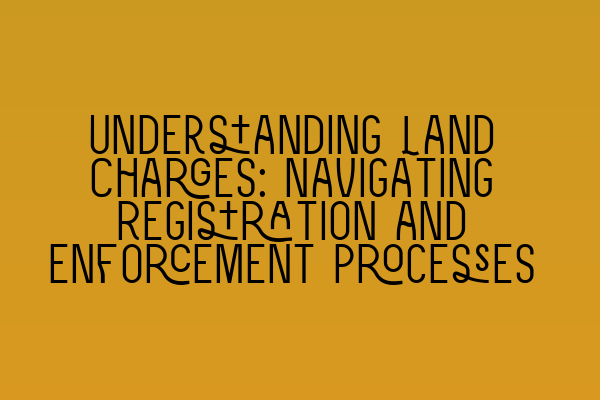Understanding Land Charges: Navigating Registration and Enforcement Processes
In the world of property law, land charges play a crucial role in safeguarding the interests of parties involved in property transactions. Whether you are a buyer, seller, lender, or solicitor, it is essential to have a comprehensive understanding of land charges and how they impact property transactions. This blog post aims to shed light on the intricacies of land charges and guide you through the registration and enforcement processes.
Before delving into the details, it is worth noting that land charges are legal interests or rights that impact the ownership or use of a property. These charges are legally binding and must be disclosed to potential buyers or lenders, as they can significantly affect the value and transferability of a property.
1. Types of Land Charges:
There are various types of land charges, each with its own specific implications. Some of the most common types include:
– Restrictive Covenants: These are restrictions placed on the use of the property. They may limit what can be built on the land, restrict certain activities, or impose obligations on the owner.
– Easements: An easement grants a third party the right to access or use a part of the property, such as a shared driveway or a right of way.
– Mortgages: A mortgage is a loan secured against the property. It gives the lender the right to take possession of the property if the borrower fails to repay the loan.
– Rights of Way: These are legal rights that allow someone to pass over another person’s land, typically for access purposes.
– Leases: A lease is a contractual agreement that grants the tenant the right to occupy and use the property for a specific period of time.
2. Registration of Land Charges:
To ensure transparency and protect the interests of all parties involved, land charges must be registered with the appropriate authority. In England and Wales, this is done through the Land Charges Department of the HM Land Registry.
It is crucial to conduct thorough searches to identify any existing land charges against a property. The results of these searches will provide valuable information that must be considered before proceeding with a property transaction.
3. Enforcement of Land Charges:
Once a land charge is registered, it becomes enforceable and can affect subsequent owners of the property. The enforcement process varies depending on the type of land charge and the circumstances surrounding it.
– Restrictive Covenants: If a restrictive covenant is breached, the affected party can seek an injunction to prevent further breaches or claim damages for any loss suffered.
– Easements: Disputes related to easements can be resolved through negotiation, mediation, or, if necessary, court proceedings. It is essential to seek legal advice to understand your rights and obligations in such cases.
– Mortgages: If a borrower defaults on their mortgage payments, the lender has the right to repossess the property and sell it to recover the outstanding debt.
– Rights of Way: Disputes regarding rights of way are often resolved through negotiations between the parties involved. In some cases, legal action may be necessary to clarify or enforce the rights.
– Leases: Lease agreements usually have provisions for resolving disputes between landlords and tenants. If a dispute arises, it is advisable to follow the terms stated in the lease agreement and seek legal advice if necessary.
4. Importance of Professional Advice:
Given the complexity of land charges and their potential impact on property transactions, it is crucial to seek professional advice from a qualified solicitor specializing in property law. An experienced solicitor can guide you through the intricacies of land charges and ensure that all legal requirements are met during the registration and enforcement processes.
Whether you are a buyer, seller, or lender, understanding land charges is essential to make informed decisions and protect your interests in property transactions. By familiarizing yourself with the different types of land charges and the registration and enforcement processes, you can navigate these complexities with confidence.
At SQE Property Law & Land Law, we specialize in providing expert legal advice and assistance in all aspects of property law, including land charges. Our team of solicitors is well-versed in the intricacies of land charges and can guide you through the registration and enforcement processes with professionalism and efficiency.
To enhance your knowledge and preparation for SQE exams, we recommend checking out our related articles:
– SQE 1 Practice Exam Questions: Familiarize yourself with sample questions to enhance your understanding and prepare effectively for the SQE 1 exam.
– SQE 1 Practice Mocks FLK1 FLK2: Practice mocks are a great way to assess your knowledge and identify areas that require improvement. Take advantage of our SQE 1 practice mocks to maximize your exam preparation.
– SQE 2 Preparation Courses: Our comprehensive SQE 2 preparation courses cover all the essential topics and provide the guidance you need to excel in your SQE 2 exams.
– SQE 1 Preparation Courses: Prepare for the SQE 1 exam with our carefully curated and tailored courses designed to equip you with the necessary knowledge and skills.
– SRA SQE Exam Dates: Stay up-to-date with the latest exam dates and deadlines set by the Solicitors Regulation Authority (SRA) for the SQE exams.
In conclusion, understanding land charges is crucial for all parties involved in property transactions. By being aware of the different types of land charges, the registration process, and the enforcement procedures, you can navigate these complexities with confidence and protect your interests. Remember, seeking professional advice from a qualified solicitor specializing in property law is always advisable to ensure compliance with legal requirements and maximize the success of your property transactions.
